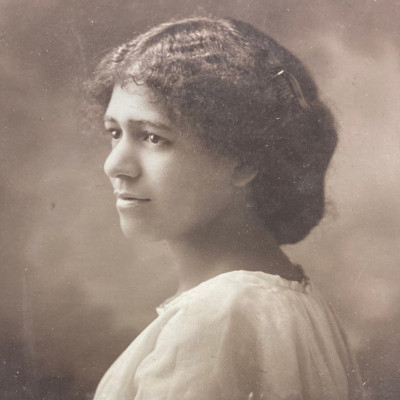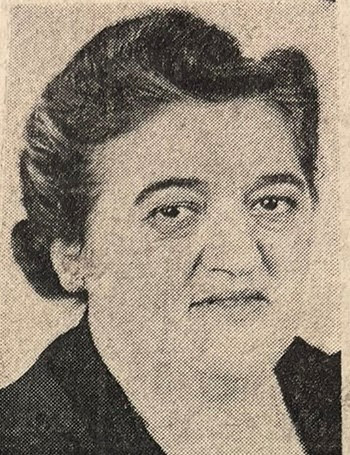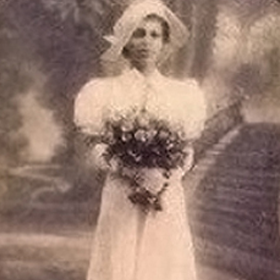A New Bedford City Councilor who represented Ward 4 for two terms, Mary Santos Barros (1923-2018) was a strong advocate for all, most notably Cape Verdeans. Recognizing that diversity is our strength, Mary taught us that we can build an inclusive community that treats all people with respect and dignity.
Community advocate Mary Santos Barros (1923-2018) was born in New Bedford on December 26, 1923 to Jose and Julia Santos, natives of Sao Nicolau, Cape Verde. She was educated in the New Bedford school system through the technical school. As a teenager Mary did domestic work. She attended the University of Massachusetts Amherst and received a certificate from the Massachusetts Institute of Technology (MIT) for participating in the Community Fellows Program oriented by Boston activist Mel King.
On July 10, 1960 Mary was married to Jeronimo R. Barros, a native of Boa Vista and a lifelong mariner. In addition to raising their children, she worked in local factories for 31 years. Mary’s concern for her own and other children led her to becoming an advocate for equal education for all children. She was active in the Parent Teacher Associations (PTA) at her children’s schools, including T.A. Greene Elementary School, later renamed as the Mary S. Barros Educational Center. Mary often served as president of these PTAs. When she officially retired from work, Mary was employed by the Massachusetts Department of Social Services.
She served on the executive committee of the Committee of Concerned Parents for New Bedford schools and was instrumental in the building and naming of the Alfred J. Gomes Elementary School, named for a Cape Verdean attorney and leader. It was dedicated on October 27, 1977. She became a voice for Cape Verdean parents, often taking immigrant parents to school committee meetings and interpreting for them. She was a member of the Board of Education for the Commonwealth of Massachusetts from 1975-1979. She was recognized by them “for her distinguished service through the establishment of increased opportunities for the youth and exemplary parent participation.” This was one of many awards that Mary received in her lifetime.
On the home front, Mary was the director of ONBOARD, the local anti-poverty agency, and a founding member of the Greater New Bedford Community Health Center. She worked tirelessly with the New Bedford Women’s Center and with the NAACP in many capacities, including promoting the hiring of Cape Verdean bus drivers in the city of New Bedford. Mary was a dedicated parishioner at Our Lady of the Assumption Church, the first Cape Verdean Catholic church in the United States, of which her father was an original founder in 1905. Mary sang in the choir and represented the church at the National Black Catholic Congress. A woman of strong faith, her door was always open to anyone who had a problem.
In New Bedford, Mary belonged to the Martha Briggs Educational Club, which promotes advanced education for girls of color; the Cape Verdean Veterans Association Women’s Auxiliary (the Cuckoo Club), which provided traditional Cape Verdean dance; as well as the Merchant Mariners’ Social Club and Auxiliary. She was a member of the Cape Verdean American Federation and on the board of directors of TCHUBA, the American Committee of Cape Verde, which promoted Cape Verdean independence, achieved in 1975. Mary was a strong supporter of the revitalization of the Schooner Ernestina, a sailing ship that brought thousands of immigrants to the United States throughout the 20th century. A believer in political empowerment, Mary helped many people become American citizens. Mary’s love of Cape Verde was as recognized in the archipelago as it was in the states. Having traveled to Cape Verde many times, she became more aware of the needs and the strengths of the land of her parents. Mary lobbied on behalf of Cape Verde on the state and federal levels. When natural disasters assaulted her family’s homeland, Mary worked with others to raise funds and send needed supplies to the people of Cape Verde.
Consistent with Mary’s deep commitment to New Bedford, she recognized that in order to accomplish certain objectives, one has to be politically involved on many levels. Mary was elected to the New Bedford City Council for two terms as Ward 4 councilor. She also was elected as a city and then a state Committeewoman to the Democratic Party Conventions. Mary was a strong advocate for all people, particularly people of color, including Cape Verdeans.
Mary died on November 14, 2018. Her legacy is the powerful example she role-modeled for her children and all community members, as she spread the knowledge that they can empower themselves as well as strengthen the community. By working together and recognizing that diversity is our strength, Mary taught us that we can build an inclusive community that treats all people with dignity and respect.
Learn more about Eulalia Mendes in this story, which is part of the digital exhibit Organizing New Bedford: Women Who Mobilized Change.
Naia Barros
edited by Liz DiCarlo
![[Mary Santos Barros], c. 21st century, Photograph, Courtesy of Naia Barros Photograph of Mary Santos Barros - an older woman with short curly hair and a patterned shirt](https://historicwomensouthcoast.org/wp-content/uploads/2020/06/Mary-Santos-Barros-280x280-1.jpg)




